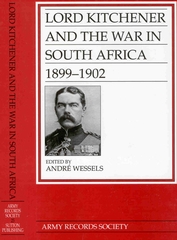Click here to view a text extract from this publication
 When Lord Roberts was sent to South Africa at the end of 1899 to take over as Commander-in-Chief of the British forces in the region, it was decided that Lord Kitchener had to go along as his Chief of Staff. These two renowned British soldiers had radically different personalities, and Kitchener – fresh from his successes in the Sudan – was reputed to be ‘difficult’, but they did not clash; as a matter of fact their abilities complemented each other to a remarkable degree.
When Lord Roberts was sent to South Africa at the end of 1899 to take over as Commander-in-Chief of the British forces in the region, it was decided that Lord Kitchener had to go along as his Chief of Staff. These two renowned British soldiers had radically different personalities, and Kitchener – fresh from his successes in the Sudan – was reputed to be ‘difficult’, but they did not clash; as a matter of fact their abilities complemented each other to a remarkable degree.At midnight on 28-29 November 1900 Roberts handed over the command in South Africa to Kitchener, convinced that only some ‘police work’ still remained to be done. However, within a fortnight, the war escalated geographically as well as in intensity, and the new Commander-in-Chief had to ask for more troops. After the Middelburg peace talks failed the war became even more bitter. In a desperate effort to end the conflict (and hopefully be sent to India as Commander-in-Chief), Kitchener expanded the blockhouse system, intensified the scorched earth policy (which necessitated the establishment of more internment camps for white and black civilians where thousands of them died), and became more dependent on an increasing number of blacks and coloureds who served in the British Army in South Africa – in either a combatant or non-combatant capacity.
In this new book, 115 mostly unpublished letters written by or to Kitchener, and a number of other relevant documents, have been reproduced in full. They include correspondence between Kitchener and Queen Victoria, Lord Roberts and Mr St John Brodrick.